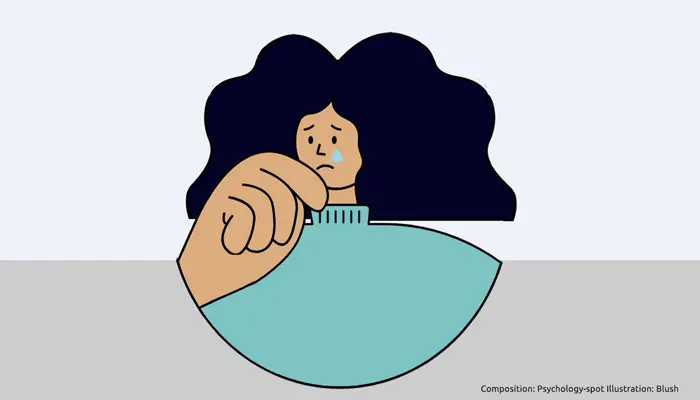
Usually we associate crying with weakness. We think that when someone is crying is weak. But that’s not true. Crying is a versatile expression that allows us free up a lot of feelings and emotions. Thus, sometimes we don’t cry for weakness, but because we have been too strong.
Often in our life we have to face a difficult situation after another, without stopping to breathe. We know that difficult moments comes all together and problems are never alone. In these cases, we force ourselves to be strong and withstand the storm.
But when at last problems allow us make a break, we collapse, we fall under the weight of our own efforts. In these cases, crying doesn’t indicate weakness, but that our forces have gone beyond the limits. Means that life has demanded too much from us and that we carry on our shoulders a too heavy burden.
No one can be strong all the days of his life
Many people have been educated to think that tears are synonymous of weakness and you must not cry because is useless. This idea often leads to suppress our sorrow, pain or frustration. But this doesn’t mean that these feelings disappear, we simply hide them. In the long term, this suppression can lead to more serious problems.
Looking normal and smiling forcedly is not a solution, because when you hide your emotions to the world, you end up hiding them also to yourself. These repressed emotions will come back under the form of health problems such as headaches, digestive disorders, muscle tension, dizziness, skin rash (psoriasis) or even more serious illnesses.
Therefore, it is important to understand that you can’t be strong every day, the time will come when you’ll have to face those feelings and let them vent, even through tears. In fact, you will realize that crying is profoundly liberating and even therapeutic. Crying is cathartic. After crying comes the calm, you’ll be able to take an emotional distance from the situation and make better decisions.
Why we “collapse” after a period of strong tension?
It is likely that happened to you some times: after a period of high stress, in which you resisted until the end, you get to a point where forces abandon you and you collapses in the most literal sense of the term.
This is due to a natural response of the body. In fact, the stress goes through three distinct phases:
1. Alarm. In this phase is triggered the fight or flight response. It increases the level of adrenaline, which generates a series of changes in the body that allow us be active, with attentive mind and ready to respond to danger. This is the stage when we simply act without thinking too much, with enormous energy.
2. Resistance. When the situation of stress persists, comes the second phase, which increases the level of cortisol, secreted by adrenal glands. This hormone helps to cope with stress, you can remain still and endure hardship. The problem is that the adrenals are fatigued and this has a negative effect on the whole organism.
3. Exhaustion. Even if the stress situation has not disappeared, there comes a point when the body is unable to maintain the level of activity and excitement. Then it is produced a fall in levels of the hormones that kept us active, and we experience a feeling of extreme fatigue, both physically and psychologically. It is at this stage when crying is not an expression of weakness, but implies that we fought too much and for too long.
Ask ourselves limits, not to give more than we can
It is true that sometimes life puts us on the ropes, but the final decision, the way we deal with problems, depends on us. For example, we can choose to close ourselves in a protective shell or, on the contrary, ask for help to avoid carry all the weight alone. We can dismiss people who are hurting us, without waiting for the wound to become deeper, or we can enjoy relaxing hobbies to protect us from a stressful job.
The keys to be strong without collapsing are:
– Pay attention to signs of stress and anxiety, don’t let them grow out.
– Feel good about yourself, accept and love yourself for who you are, so that, even if wrong, the error doesn’t become a useless burden.
– Ask yourself clear limits, not so much for the others but for yourself, so you know when it’s time to say “no” in a definitive way.
– Allow yourself to be weak, occasionally, repeat to yourself that you are not able to deal with the situation, you can not take on more responsibility and you need to take a break.
– Pretend from the others the same respect, love, affection and recognition you give them. We can not continually give without receiving anything in return, because we too need support and understanding.



